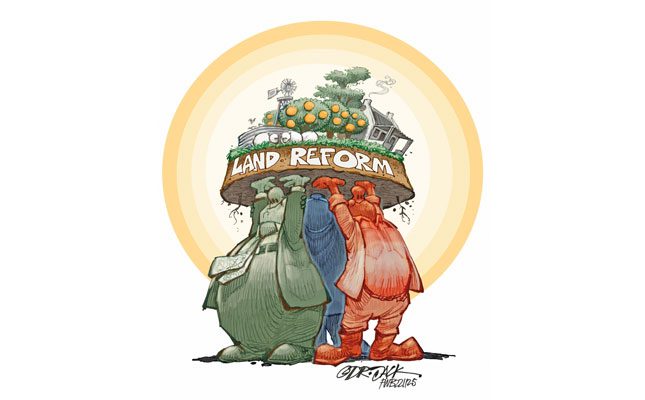
The degree of success of the land reform programme will be determined by the level of private-sector participation and the political will to expeditiously address the challenges that plague it.
This will, among other things, require the implementation of the recommendations detailed in several reports, including the High-Level Panel Report, often referred to as the Motlanthe Report, as well as the Presidential Panel Report on Land Reform.
Barriers to land reform
The challenges facing the land reform programme include, but are not limited to the following:
- Addressing corruption;
- Dealing with dysfunctional and inept communal property associations that require targeted support;
- Insufficient post-settlement support for beneficiaries;
- The state’s lack of capacity to implement its programmes;
- Fragmented approaches to land reform by various government departments;
- Poor monitoring and evaluation of the programme; insufficient resources earmarked for the support of beneficiaries; and
- The absence of innovative financing mechanisms to fund land reform and address restrictions that affect access to finance.
These hurdles must be addressed urgently if we are to have meaningful progress. Failure to deal with the matters requiring attention will compound the problems, slow progress and contribute towards rising dissatisfaction.
The reported widespread failure of claimant communities to keep their land productive has been attributed to the dearth of post-settlement support, a lack of access to capital and markets, the inability to gain water rights, and other factors.
Government on its own cannot successfully undertake the land reform programme. Despite its socio-political significance, the programme has had to compete for budgetary allocation against other pressing social expenditure demands, such as public healthcare, education and social services.
The budget allocation for land reform has in fact declined steadily over the past few years, with the outbreak of COVID-19 exacerbating the issue.
Private-sector support
Many South African businesses are eager to support deserving land reform projects and partner with land reform beneficiaries. However, the private sector requires an enabling environment that is underpinned by policy certainty, effective monitoring and evaluation, and sound governance structures.
This sector has the resources, skills and expertise sorely needed in the land reform programme, particularly by claimant communities, which lack these resources due to injustices of the past.
As Vumelana Advisory Fund (Vumelana) has helped claimant communities to keep
their land productive, our experience has taught us that partnerships between beneficiary communities and private investors are crucial to the success of the land reform programme.
These partnerships don’t form naturally, however, as the two parties don’t necessarily know or understand each other.
Moreover, such partnerships must be anchored in commercially sustainable activities, where the benefits for all parties are clearly defined in order to avoid future disagreements, the risks are carefully apportioned, and the agreements entered into meet the required legal standards.
Addressing socio-economic challenges
Businesses are driven by the profit motive when they enter into any form of partnership. Nonetheless, at Vumelana we have noted that the private sector recognises the importance of a successful land reform programme in addressing the socio-economic challenges facing the communities in which they operate.
Many investors we’ve worked with have sought to leverage their partnerships with beneficiary communities to foster job creation, income generation, skills development, access to markets, and other related benefits.
The formation of these partnerships requires independent facilitation in order to ensure fairness and sustainability. Even so, this requires funding, and corporates and other key stakeholders can contribute by providing funding support to organisations such as Vumelana, which in turn can expand their reach and support more land reform beneficiaries to ensure the productive use of restored land.
The role that the private sector can play in the land reform programme cannot be overstated. Enticing this sector to participate in the programme can go a long way towards plugging the gaps in it.
Land reform is a constitutional imperative, and it is important for all stakeholders to support the process. In this regard, the business community has a critical role to play; this is also good corporate citizenship.
In addition, successful and sustainable land reform is crucial for social cohesion in South Africa, and failure to support it and make it work will come at our own peril as a nation.
Vumelana’s experience in the land reform programme bears testimony to the fact that it is possible for the private sector to play a constructive role as well as run profitable businesses in partnership with land reform beneficiaries.
Concerted efforts need to be made to reverse the trust deficit between government, private-sector investors and beneficiary communities. Furthermore, all stakeholders need to see themselves as the legs of a table; if one leg is missing, the table will be unsteady and eventually topple over.
The views expressed in our weekly opinion piece do not necessarily reflect those of Farmer’s Weekly.
The Vumelana Advisory Fund is a non-profit organisation that helps beneficiaries of South Africa’s land reform programme put their land to profitable use by establishing commercially viable partnerships between communities and investors.











